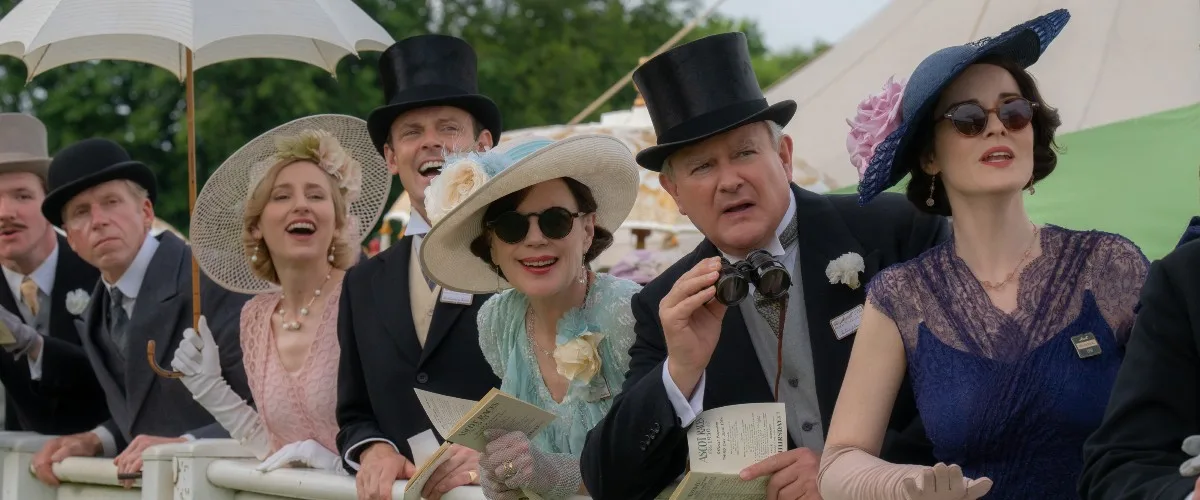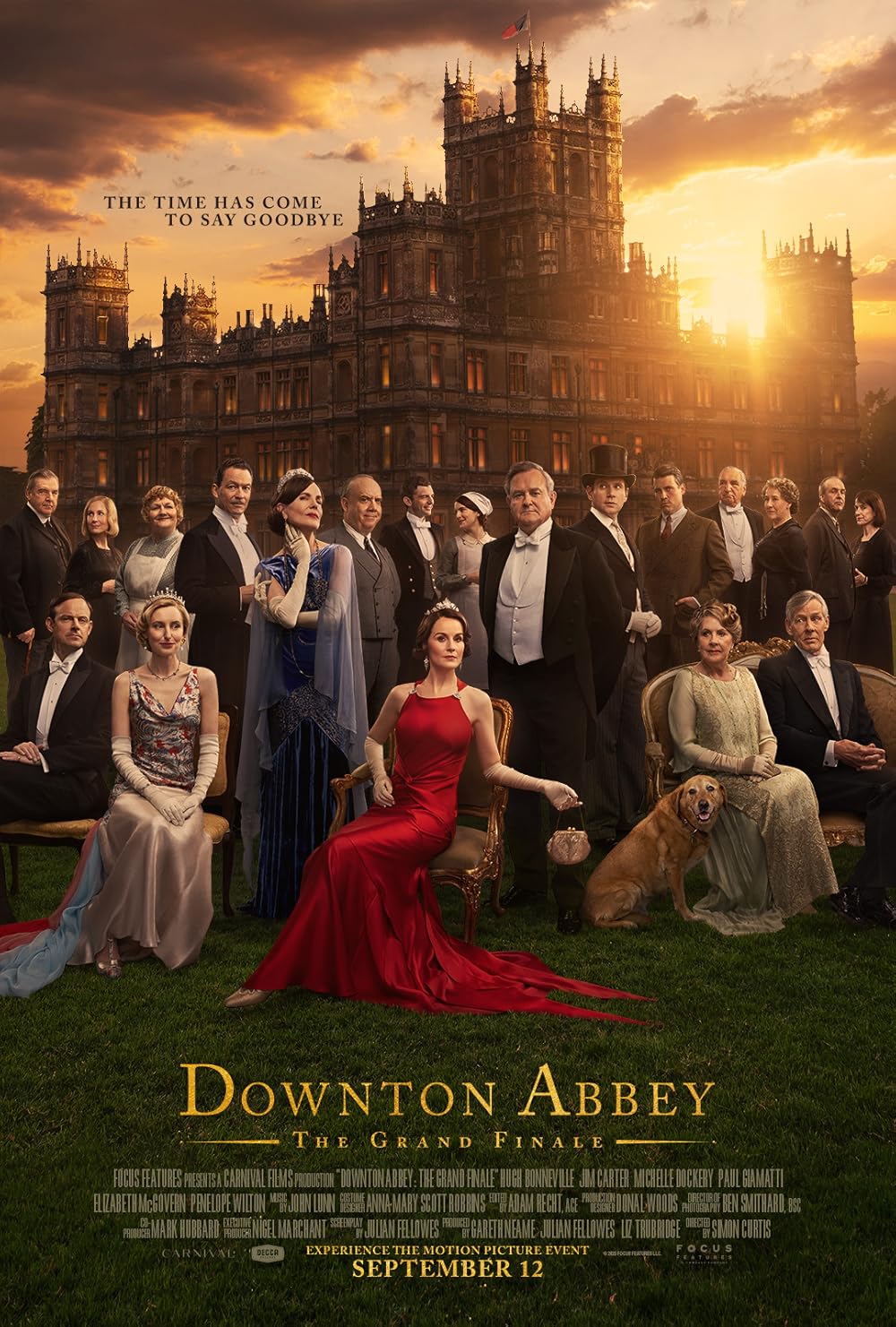There’s a shot in “Downton Abbey: The Grand Finale,” the third feature based on the popular TV series, that sums up the affection that fans have for the Crawley family and their estate. It’s a helicopter shot following a roadster as it drives important characters through the English countryside. The camera pivots slowly, tracking screen right, away from the motorcar. You know from a lifetime of movie-watching that it’s about to reveal the house. But the movie makes you wait and wait. Finally, there it is: the house where all of the drama has unfolded ever since Julian Fellowes’ series debuted in 2010.
It’s not a long moment, but it makes an impact, and if you see the movie in a crowded theater, as I did, you’ll feel a collective buzz of anticipation as the camera moves to reveal the place that everyone came to see. I was reminded of the moment in “Star Trek: The Motion Picture,” where the audience is treated to a flyby of the renovated Enterprise as Jerry Goldsmith’s score hyperventilates on behalf of the viewers. “The Grand Finale” doesn’t go to such extremes, of course, because it’s about English people and a handful of folks who are reserved enough to pass for English.
But here, and all through the film, it confidently cashes out the considerable emotional capital that the series has accrued. This is a story about people trying to avoid having to take a last look at Downton Abbey before moving on. Which is to say that it’s about deciding whether or not to accept that time and circumstances have changed and go with the flow, rather than resisting the inevitable. It’s 1930, a year after a stock market crash that threw the world into an economic tailspin. The Crawley family has had to tighten its belt—as they’ve done periodically over the timespan of the show, which starts in 1920—but not so much that they’ve given up their staff of servants and their assorted holdings, which include Dower House, former residence of Violet Crawley, Dowager Countess of Grantham (the late Maggie Smith, honored with a dedication as well as oil painting of the countess looming over the front hall).
The low-level anxiety cranks up when the family is visited by American businessman Harold Levinson (Paul Giamatti), brother of Cora Crowley (Elizabeth McGovern). He’s brought another American, Gus Sambrook (Alessandro Nivola), a financier who, Harold says, helped keep the matriarch’s side of the family solvent after the crash. Unfortunately, Gus made bad decisions after that, depleting the nest egg that the Crowleys thought they could break open to renovate Downton Abbey and turn it into a rental property that could generate future income. Gus says he has a plan to take any funds that the extended family can scrape together and put them into high-risk/high-reward investments that will get them out of the hole that he and Harold put them in. Not everyone is on board with this.
At the same time, Lady Mary is getting a divorce, the news ripples through the surrounding community, making her a pariah among the high society people she used to call friends (even though they really weren’t). Some levity is added by actor Guy Dexter (Dominic West, totally believable as a Clark Gable-style movie star), who was at the center of the last movie. Dexter is reintroduced as the star of a London play by Noël Coward (Arty Froushan, who is absolutely credible playing one of the most charming men who ever lived). The family, sans Mary, is in attendance and goes backstage to meet with Guy, Coward, and Thomas Barrow (Robert James Collier), who is now Guy’s assistant and lover. “They’re rather hearty with each other, aren’t they?” Robert says to Cora, oblivious.
Dexter, Coward, and Barrow’s presence at Downton Abbey provides the movie with some of its more magical moments, the best of which finds Coward accepting a request to perform (he never says no) and singing to the extended family. Curtis lets the performance play out at length. Here, as in the show’s better moments, we get a sense of what constituted entertainment in an era when mechanical reproduction of images and sounds still seemed new, and people had to pay attention to things and be open to whatever they made them feel. What many of the characters are feeling, though, is dread of what’s next, and discomfort with the present. “Life is lived in chapters, and there’s nothing wrong when one chapter ends and another begins,” a character remarks later, after several twists that tighten the future’s viselike grip on the Crawleys.
“The Finale” is probably the tightest of the three movies, though also the most businesslike in its distribution of moments and subplots. Fellowes, whose breakthrough project was the 2001 Robert Altman drama “Gosford Park” (also about an upstairs/downstairs cast of characters in an English manor), knows these characters so well that he can pack a lot into a brief exchange. Some of the most important business in the movie is resolved in a scene that might last a minute and have as few as four lines. This is very much an “old movie” way of telling an ensemble story, and Fellowes and Curtis are quite good at it, after all this time, though one might sometimes wish that they’d loosened their belts a bit and let the film run longer, since everybody who’s going to buy a ticket to see it is deeply invested already, and wouldn’t mind lingering a tad, here and there.
I’m not going into the plot in detail here because this is the kind of movie where the whole point is to wonder what’s going to happen next and how it will affect the story, which is told in such a way that what happens is invariably going to mean more to the audience than what it “means” in some larger sense. “Downton Abbey” has always been too sentimental about the rich and the royal during an age when the most privileged people in Great Britain lived that way because of inherited wealth and money built up from centuries of imperial plunder—something the dialogue on the show addressed, but only occasionally, and with obvious reluctance, because it breaks the spell cast by the sumptuous costumes and great halls and coaches and cars, and the items of furniture that probably have more market value than most people’s entire net worth.
The main appeal here is the chance to spend time in the company of superb actors who all wear their characters as comfortably as an old silk robe. Fellowes honors all of them with quotable lines. “I want my virtues to be celebrated and my sins forgiven,” Mary tells her sister Edith (Laura Carmichael). “You should be grateful for what you get,” Edith replies. This sounds like an insult on the page, but in context, it’s a warm sentiment.
Best in show might go to West and Froushan, who have the kind of confident coolness that could fuel a whole other series of films, preferably focusing on Noël Coward and Guy Dexter traveling the world with Thomas Barrow, doing plays and movies and visiting troubled people and lifting their spirits with music and witty quips. “Not much has changed since 1850, has it?” Coward asks Dexter, sardonically. “Well, you can see women’s ankles now,” Dexter replies. “That doesn’t do us much good, now, does it?” Coward says, and they both grin.




















